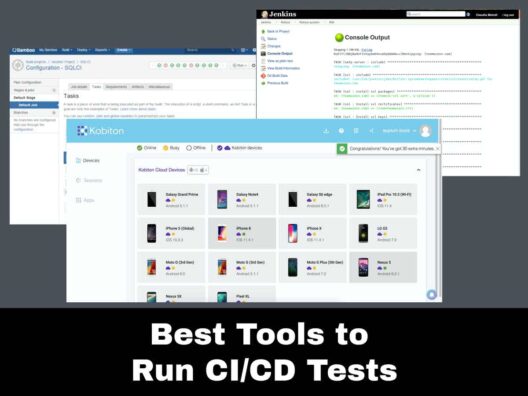Continuous Integration (CI) and Continuous Delivery (CD) are essential to help businesses deliver high-quality products quickly. These practices bridge the gap between development and operation by automating the process of development, testing, and deployment. These CI/CD practices are implemented using advanced tools and services.
If you're one such business looking to make the most of what CI/CD offers or just a curious learner, below are some of the best tools to easily run the CI/CD tests.
Here is our list of the best tools to run CI/CD tests:
- Tricentis Tosca – EDITOR’S CHOICE This software testing system can integrate into CI/CD pipelines for continuous testing of desktop software, cloud systems, APIs, Web applications, and mobile apps. Test each unit and then an entire suite together. Offered as a cloud platform or a software package for Windows Server. Get a 14-day free trial.
- Tricentis qTest – FREE TRIAL A test manager for Agile and DevOps teams that promotes collaboration by centralizing testing documentation. Available as a SaaS platform or software for Windows Server, Linux, or Docker. Get a 14-day free trial.
- Kobiton The AI tool with advanced features to make continuous testing simple and seamless.
- Jenkins This open-source automation tool supports software application development, testing, and deployment while facilitating CI/CD.
- Bamboo This CI tool automates build, test, and deployment in a single workflow to improve the reliability and pace of software development.
- Docker A containerization platform that packs applications and dependencies into a container for seamless integration and deployment across all environments.
- Jira This agile and DevOps management tool makes it easy for individuals and teams to practice CI/CD.
- Worksoft This automation platform optimizes the lifecycle of your business processes, speeds up innovation, and reduces the risk of disruptions.
- GitLab A web-based DevOps lifecycle tool for tracking issues and implementing continuous integration and delivery.
Do you know that the CI tools are estimated to grow to $1139.3 m by 2023?
This astounding rate is because more companies understand the power of these tools and want to leverage them for the streamlined development and delivery of software applications.
Let's dive down into the features of each of these tools to help you decide the best one for your business.
The Best Tools to Run CI/CD Tests
1. Tricentis Tosca – FREE TRIAL
Tricentis Tosca tests software in all its formats, whether it is constructed as a package for endpoints or cloud platforms, an API, a mobile app, or a website. The benefit of this system is that it can test the same system presented in different formats, ensuring consistency of a presentation. The package includes a high degree of automation, which starts with the generation of test scripts.
Features
The notable features of Tricentis Tosca are:
- Provides a business requirement definition service that formulates a functional model
- Generates test scripts for functional and regression testing
- Tests individual modules, software suites, and workload automation
- Can test across third-party SaaS platforms from Oracle, SAP, and Salesforce
- Automated testing triggers that link to activity in a code repository
- Web application, website, and mobile app testing
- Test software packages for endpoints and cloud platforms
- API testing
- CI/CD pipeline integration for Agile and DevOps projects
- Integration with Jenkins, Azure DevOps, and GitLab
- Service virtualization that abstracts technical complexities
- Possible to test suites with missing components
- Keeps track of modules referring to previous tests when they are retested
Pros:
- Prioritizes testing for business-critical modules
- Test data management
- Integration testing can include the ERPs and CRMs of Oracle, SAP, and Salesforce
- Test script module reuse
- Detailed bug reports
Cons:
- No price list
Tricentis doesn’t publish its prices. Contact the company for more information.
Download: Get access to Tosca on its cloud-based SaaS platform or download the software package for Windows Server. Available for a 14-day free trial.
EDITOR'S CHOICE
Tricentis Tosca is our top pick for a CI/CD testing tool because this software testing package uses a model-based, scriptless approach. By focusing on business logic rather than code, Tosca allows users of all skill levels to create and maintain automated tests efficiently. This strategy significantly reduces the time and effort needed for test maintenance as applications evolve, making it particularly valuable for large-scale and rapidly changing environments. Tosca integrates with CI/CD pipelines, supporting continuous testing and enabling faster, more reliable software releases. The platform supports web, cloud, desktop, mobile, and enterprise applications, including complex systems like SAP, Oracle, and Salesforce. Tosca also offers advanced capabilities in API testing, test data management, and service virtualization, ensuring comprehensive and accurate end-to-end testing. Tosca’s reporting system provides detailed insights into test coverage, execution, and application quality, empowering teams to make informed decisions and improve their software delivery processes. The service’s focus on reducing maintenance and enhancing efficiency makes it an essential tool for organizations aiming to accelerate their testing efforts.
Download: Get a 14-day free trial
Official Site: https://www.tricentis.com/software-testing-tool-trial-demo/tosca-trial
OS: Windows Server or cloud
2. Tricentis qTest – FREE TRIAL
Tricentis qTest is a test management package that centralizes documentation and promotes collaboration through role-based access controls to the cloud-hosted dashboards. Businesses that want more autonomy can choose to download qTest as a software package. This system is suitable for Agile, waterfall, and DevOps development strategies.
Key Features:
Here are the standout features of Tricentis qTest:
- Provides a unified platform for managing all aspects of the testing lifecycle
- Designed to support Agile methodologies and integrates seamlessly with DevOps practices
- Integrates with popular tools like Jira, Jenkins, and Selenium
- Real-time visibility into test activities through customizable dashboards and reports
- Supports both manual and automated testing, allowing flexibility in testing approaches
- Ensures accessibility for distributed teams, supporting global collaboration
- Provides security through customizable user roles and permissions
- Scales with the organization’s testing needs
- Detailed, customizable reports for tracking test progress and outcomes
- Manages test execution across various environments, ensuring thorough coverage
- Ensures end-to-end traceability from requirements through to defects, simplifying compliance
- Enhances continuous integration/continuous delivery by embedding testing into the development pipeline
- Facilitates better communication and alignment between development, QA, and business teams
Pros:
- Version control through third-party repositories
- Data access and connection security
- Can adapt to existing CI/CD pipeline workflows
- Cloud or on premises deployment options
Cons:
- No prices
Contact Tricentis for prices. Tricentis provides qTest as a cloud-based SaaS package, however, it is also possible to request the package for download. The system will run on Windows Server, Linux, or Docker. Assess qTest with a 14-day free trial.
3. Kobiton
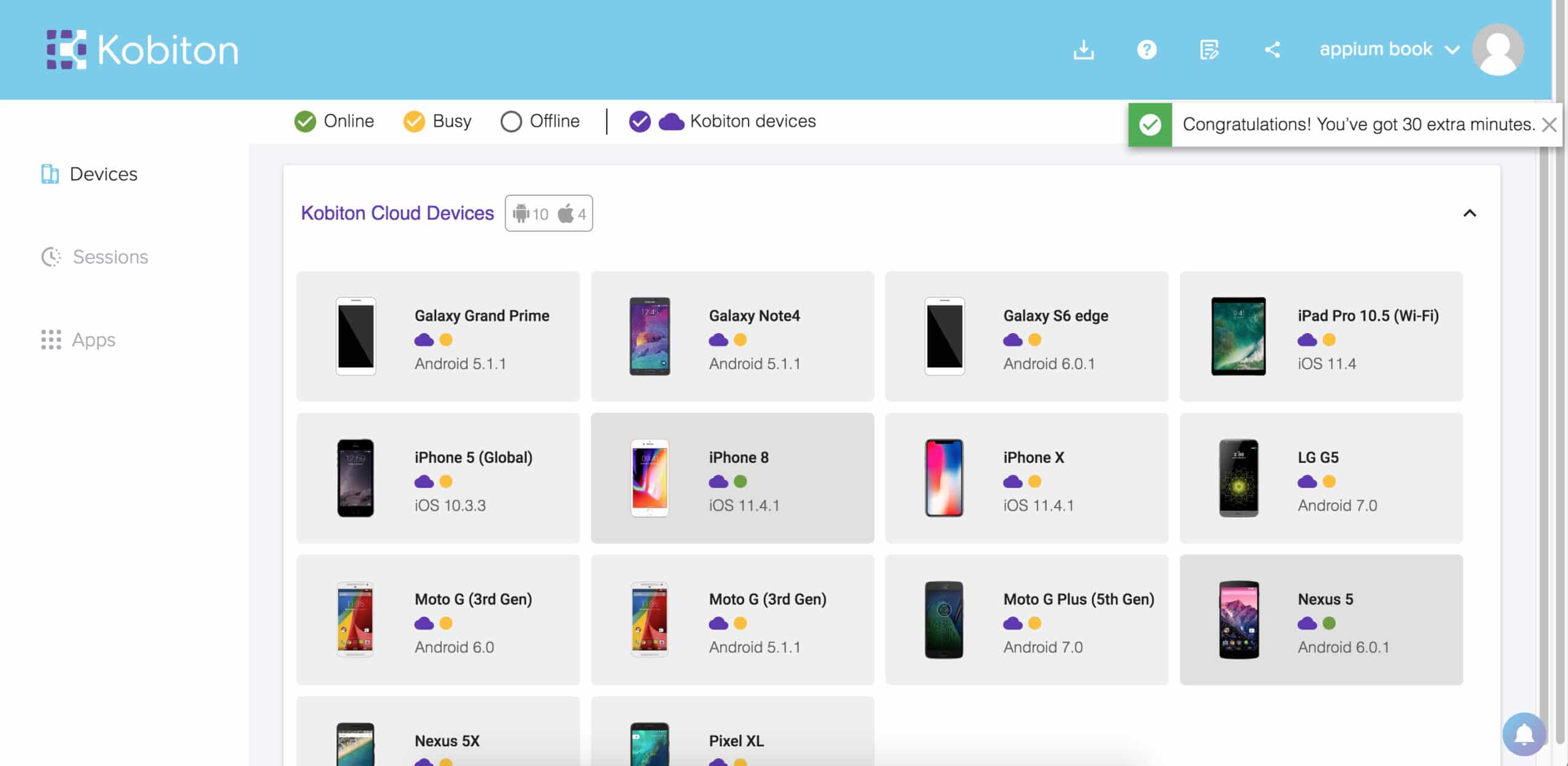
Kobiton is an advanced automation tool for continuous testing across all devices and platforms. It comes with many extensive features for making CI a seamless process.
Features
Here's a look at some of Kobiton's features.
- Works well on private and public cloud, on-prem, and hybrid environments.
- Supports scriptless automation, so complex Appium scripts are not required.
- Enables you to test on real devices using any action such as tap, swipe, and scroll.
- Easily converts manual test sessions into dynamic automated test scripts.
- Highly responsive to every device.
- Connects to internal devices as well, thereby enabling you to create a local cloud when needed.
- Centralizes the testing activity for easy sharing with teams.
- Boosts the overall collaboration and efficiency of your team.
- Automatically captures screenshots and videos to give you a comprehensive idea of your tests.
- Displays historical sessions for easy comparison.
- Supports the latest automation frameworks, including parallel automation.
- Its smart app directory makes it easy to access and test specific mobile applications.
- Helps to scan your applications for security loopholes.
Pros:
- Easy to use interface – can get started right away
- Supports both manual and automated CI/CD testing
- Includes a variety of browsers and devices for testing
- Supports multiple automation frameworks
Cons:
- Can take time to explore all features
Pricing:
Kobiton offers five plans, and they are:
- Startup – $500/year. It offers scriptless test automation, supports unlimited users, and is limited to 500 minutes per month.
- Accelerate – $2000/year. Ideal for teams that want to ramp up automation. It also includes visual, and text assertions, JIRA integration and is valid for up to 2,000 minutes a month.
- Scale – $8,000/year. Ideal for teams that want wide market coverage. Along with Accelerate plan's features, it also provides scriptless Appium exports and connections to local devices.
- Growth – $16,000/year. Ideal for companies with advanced QA operational needs. It supports up to 7,000 minutes per minute.
- Enterprise – Offers custom features for your business needs. Contact the sales team for a custom quote.
Download: Click here to start a free trial.
4. Jenkins

Jenkins is a popular open-source automation project for building, testing, and deploying software applications and, in the process, leverages the power of CI/CD for quick turnaround times.
Features
The prominent features of Jenkins are:
- It is platform agnostic and hence works well on Windows, Linux, and macOS. It even comes with ready-to-run packages for these operating systems.
- Comes with a web interface for easy setup and configuration. This interface also has built-in help and error-checking functions.
- Integrates well with hundreds of plugins.
- Its plugin architecture makes it highly extensible.
- It can be easily distributed across multiple machines for faster builds and tests.
- Uses cron expression for scheduling.
- Backed by a solid community of users.
- Easy to learn and use.
- Uses a master-slave architecture to reduce loads on the CI server.
- Sends notifications of the build status.
- Offers quick release cycles.
- Supports shell and Windows command execution, especially in pre-build.
Pros:
- Completely free software
- Many features can be extended via plugins
- Available for WIndows, Linux, Mac OS, and Unix
Cons:
- The interface could benefit from an update
- Support and bug fixes are dependent on the community
Pricing: 100% Free!
Download: Click here to download Jenkins.
5. Bamboo
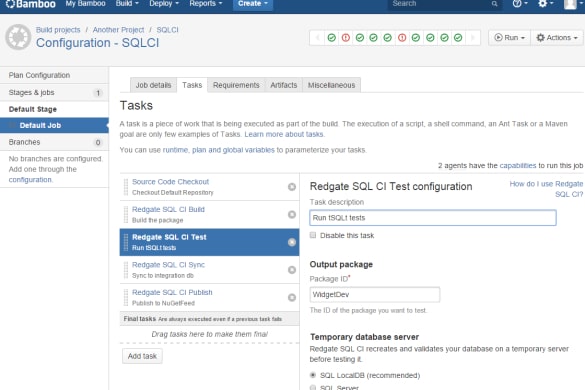
Bamboo is a CI/CD pipeline that allows teams of any size to build, test, and deploy reliable and resilient applications within a short time.
Features
The features of Bamboo are:
- Supports agile development with automated workflows.
- Enhance the resilience of teams with its built-in disaster recovery features.
- Increases capacity as your organization grows, hence there is little impact on performance.
- Integrates well with most popular applications like Jira, BitBucket, Docker, AWS CodeDeploy, and more.
- Built for parallel execution.
- Comes with built-in deployment features.
- Integrates with Opsgenie for quicker and more thorough investigations into specific incidents.
- Enables you to have complete control over your environment.
- Supports cold standby for high availability.
- Provides complete traceability from feature request to deployment.
- Offers REST APIs.
- Supports built-in Git branching workflows.
- Easy to execute.
Pros:
- Offers numerous customization software development options
- Includes a prebuilt deployment module
- Integrates with tools such as Jira and AWS CodeDeploy
Cons:
- Would like to see more software monitoring features built-in
Pricing:
Pricing is based on the number of agents and not users, as more processes can run concurrently with more agents.
- 1 remote agent – $1,200
- 5 remote agents – $3,200
- 10 remote agents – $5,840
- 25 remote agents – $11,600
- 100 remote agents – $23,280
- 250 remote agents – $58,160
- 500 remote agents – $87,280
- 1000 remote agents – $133,840
- 2000 remote agents – $187,380
Download: Click here to try it for free.
6. Docker
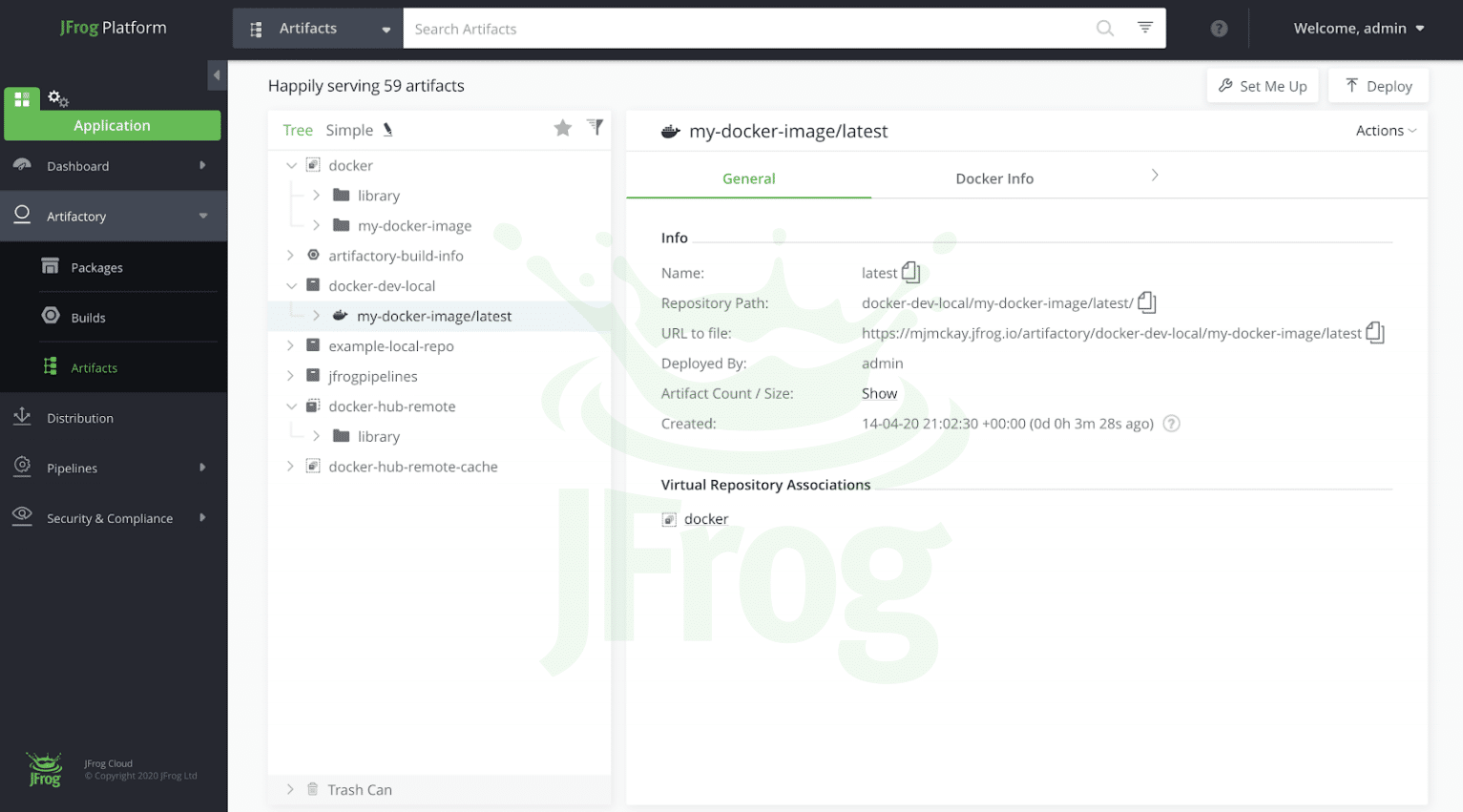
Docker is a containerization platform that packages your applications and dependencies into a neat container so that the entire unit can be deployed or integrated anywhere.
Features
The features of Docker are:
- Helps developers to build and test code in any environment.
- Makes it easy to catch bugs early in the development lifecycle.
- Streamlines the development and deployment processes
- Saves time on builds.
- Enables developers to test parallelly.
- Integrates with source code control tools like GitHub and Jenkins.
- Eliminates the effect of inconsistent environment configurations and setups.
- Streamlines DevOps as developers can focus on development while system administrators can focus on deployment.
- Standardizes environments with improved version control.
- Provides unlimited repositories across all plans, though the lower plan repositories are public, while in the higher programs, you have the option to keep them private.
- Scans the hub for vulnerabilities.
- Provides role-based access control.
- Generates audit logs to provide greater visibility into the operations.
Pros:
- Intuitive interface – easy to learn and navigate
- Supports a wide range of integrations
- Provides role-based access controls – great for teams
- Flexible pricing options – great for any dev team
Cons:
- Can take time to fully explore all options available
Pricing:
Docker offers four editions, and they are:
- Personal – FREE. Ideal for individual developers, communities, and small businesses. Comes with Docker desktop, Docker engine, and Kubernetes.
- Pro – $5/month. Ideal for individual developers looking to accelerate their productivity. Comes with private repositories, five concurrent builds, 300 hub vulnerability scans, and five scoped access tokens.
- Team – $7/user/month. It is ideal for small teams of more than five members as it comes with collaboration and productivity-boosting features such as concurrent builds, audit logs, unlimited scoped tokens, role-based access control, and more.
- Business – $21/user/month – Works well for medium and large companies with 50+ members. It comes with advanced security capabilities such as centralized management, image access management, SAML SSO, and more.
Download: Click here to get started on the free plan.
7. Jira
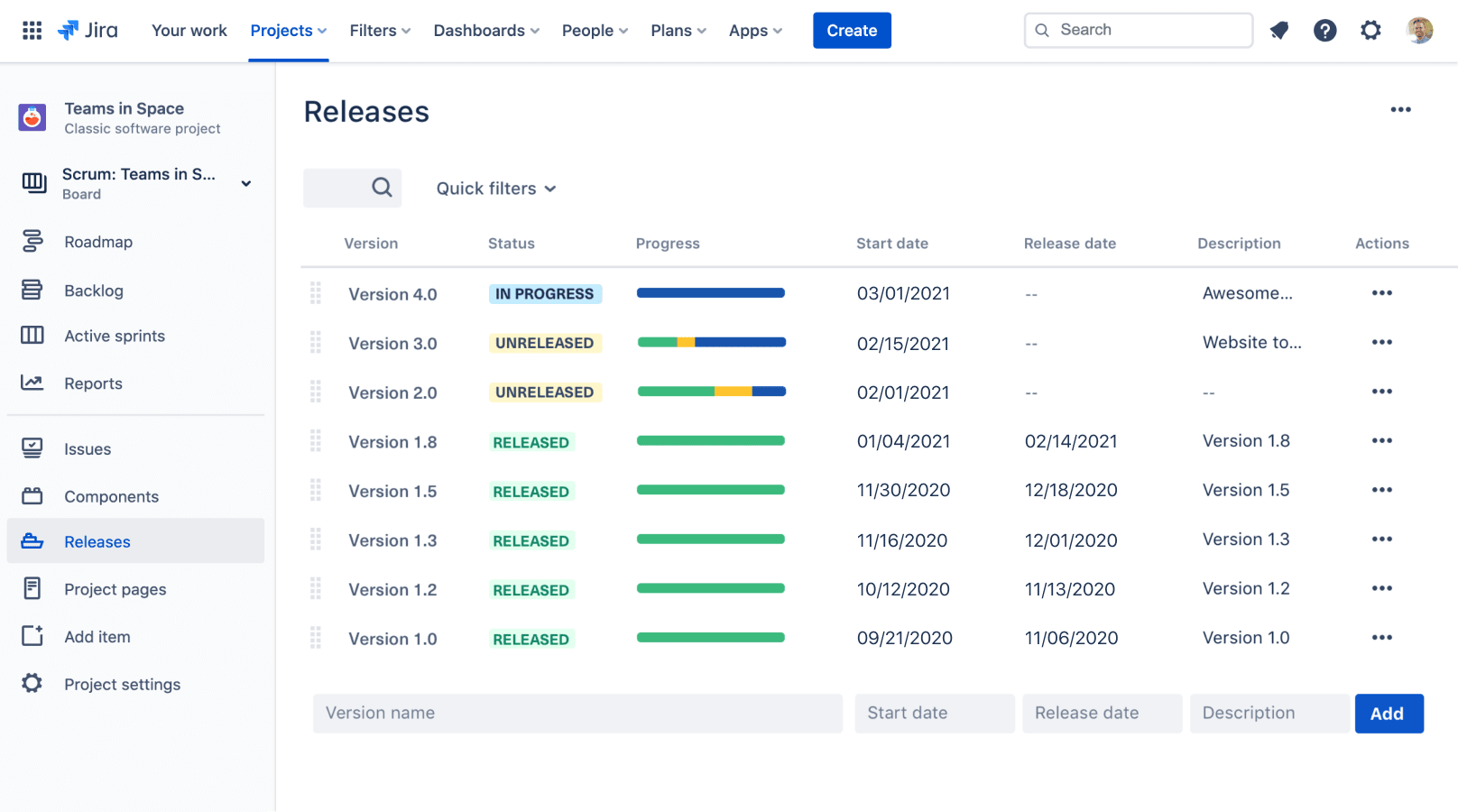
Jira is an agile and DevOps tool used for bug tracking, project management, and workflow monitoring. It works well across all use cases and throughout the software development lifecycle.
Features
The features of Jira are:
- Works well for agile teams that focus on delivering iterative and incremental value quickly.
- Comes with customizable scrum boards.
- Offers flexible Kanban boards to give teams a clear understanding of what's coming next.
- Enables teams to deliver maximum output in minimum time.
- Draws the big picture and connects them with every team's workflow to help everyone understand the larger goals and roadmaps.
- Provides out-of-the-box reports that contain real-time and actionable insights.
- It evaluates the team's performance across every sprint.
- Enables you to view code and deployment status and repositories at a glance.
- Visualizes and measures progress.
- Comes with drag-and-drop capabilities to build automation rules.
- Scales well to meet your organization's growth.
- Provides advanced security features such as SAML SSO, automated user provisioning, two-step verification, and more.
- Enables you to create custom filters using Jira Query language (JQL).
- Integrates with developer tools for end-to-end traceability.
- Integrates well with more than 3,000 apps.
- Supports the creation of customizable workflows to meet all business needs.
- Has mobile apps to access information on the go.
- Provides a set of rich and robust APIs for extensibility.
Pros:
- Provides an easy platform to integrate other Jira solutions
- Leverages artificial intelligence and machine learning to improve alerts and escalations
- Includes over 550 marketplace apps
- Widely supported – large community
- Excellent knowledgebase features
Cons:
- Could use a longer trial to test all features
Pricing:
Jira comes in four pricing plans, and they are as follows.
- Free – Works well for a small team of fewer than ten users to help them plan and track their work efficiently.
- Standard – $7.50/user/month – Ideal for a growing team looking to improve collaboration and productivity.
- Premium – $14.50/user/month – Works well for organizations that are looking to scale.
- Enterprise – Custom quote. Ideal for enterprises with global security and governance requirements.
Download: Click here for the free plan.
8. Worksoft
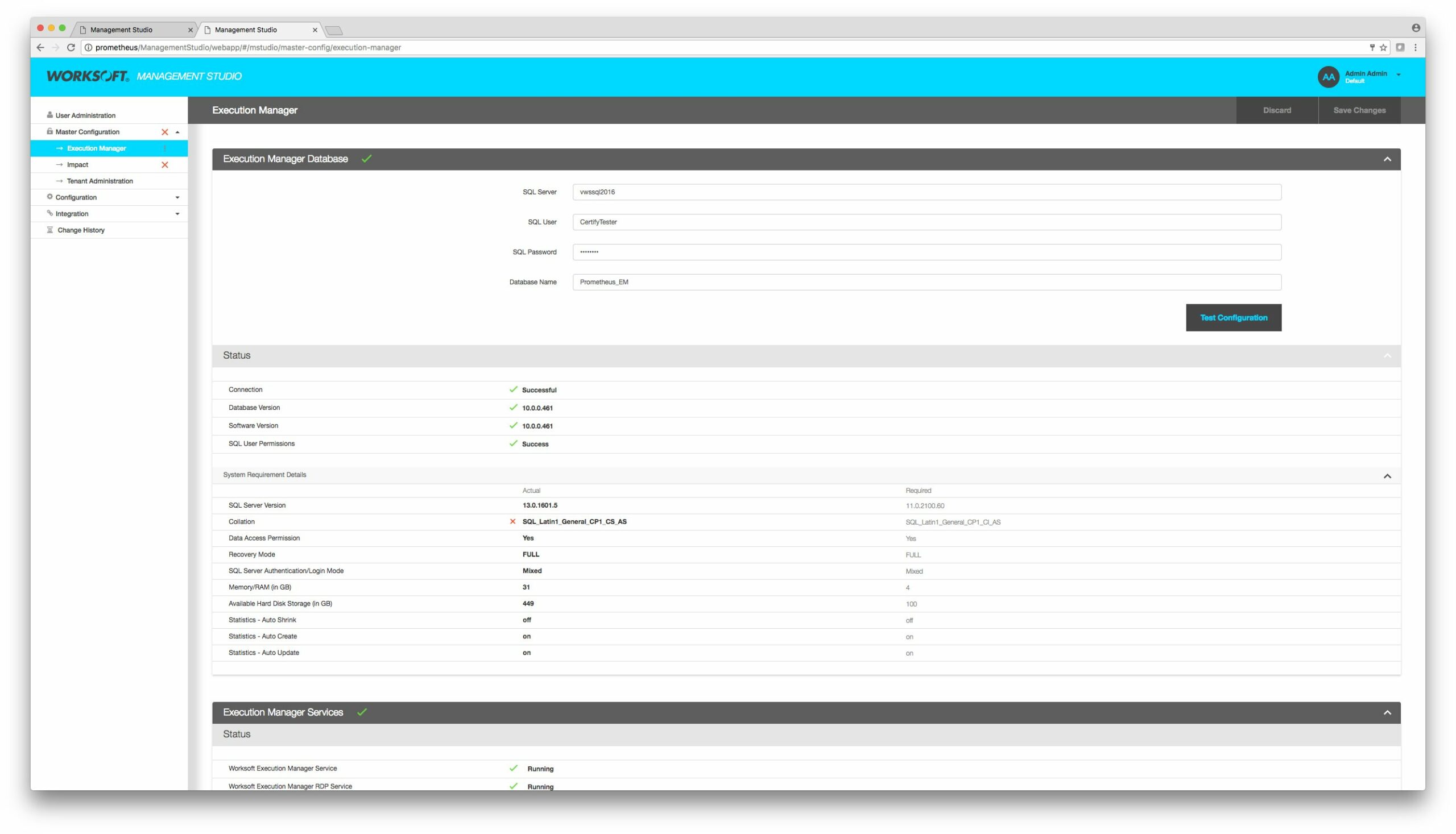
Worksoft is a continuous test automation platform that optimizes the lifecycle of your business processes to speed up innovation and reduce risk.
Features
The features of Worksoft are:
- Optimizes and speeds up the process of business process automation.
- Provides 360-degree insights for comprehensive visibility.
- Speeds up the process of project completion.
- Validates and executes complex business processes.
- Automates the discovery of bugs and test automation to reduce errors.
- Enhances consistency across processes.
- Provides comprehensive insights into the performance of specific processes.
- Seamlessly integrates RPA, testing, and intelligence.
- Reduces risk and rework for digital transformations.
- Optimizes business outcomes.
- Connects business processes across diverse applications.
- Facilitates alignment between IT and business.
- Analyzes and validates the entire customer journey.
- Ensures flawless delivery of complex applications, including custom and packed ones.
- Makes it easy to understand the current state of business processes.
- Maps processes as they traverse across multiple applications.
- Enables the reuse of test automation.
- Converts process data across the entire organization into actionable insights.
- Bridges the gap between IT goals and business outcomes.
- Drives process improvements to help businesses quickly leverage their benefits.
- Enables an organization to adapt to changes dynamically.
- Implements connective process intelligence to improve automation benefits and speed.
Pros:
- Supports continuous test automation – great for lifecycle management
- Integrates with business intelligence platforms
- Highly configurable – great for custom filters and granular testing
- Bridges the gap between CI tests and business impact
Cons:
- The interface could use improvement
Pricing: Talk to an automation expert for a custom quote.
Download: Click here to request a demo.
9. GitLab
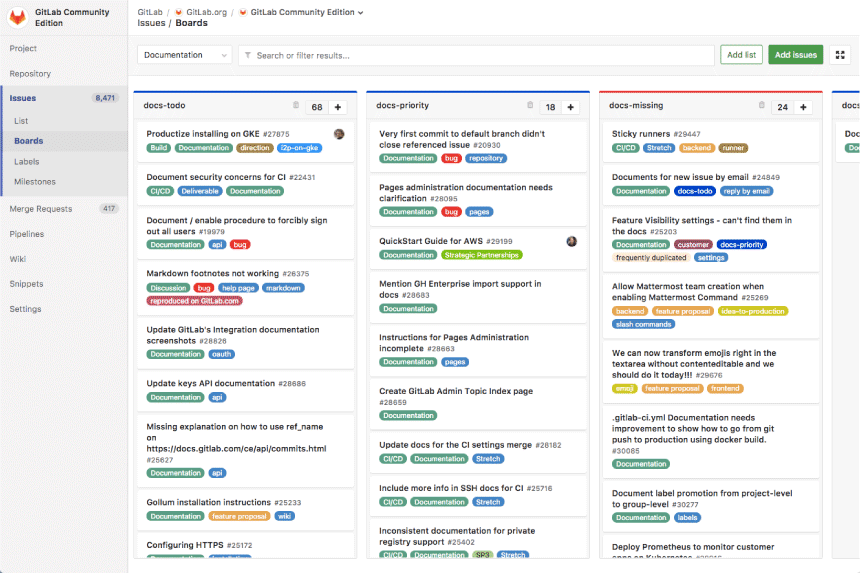
GitLab is a DevOps platform delivered as a single application that spans the entire development lifecycle and improves the efficiency of all the processes involved.
Features
The features of GitLab are:
- Provides visibility and insights into business processes.
- Allows you to restrict access by IP address.
- Supports groups and their management. For example, group owners can prevent new members from joining new projects within a group or can easily search for specific groups through an intuitive drop-down menu.
- Provides support for project badges that enable quick identification.
- Allows you to organize your repository into private, public, and internal projects.
- Enables admins to track and analyze changes through an advanced audit system.
- Complies with all major regulations.
- Creates a report of all users and their permissions.
- Supports an advanced credential management system for greater security and streamlined access to your environment.
- Comes with a dashboard that provides an aggregated status of all your projects in a centralized place.
- Integrates well with this-party systems to better manage merge requests.
- Defines and enforces group-level merge settings when required.
- Provides granular control over user roles and permissions.
- Enables you to manage GitLab instances through LDAP/AD integration.
- Supports Kerberos user authentication.
- Provides many user authentication options such as two-factor authentication, SAMl SSO for groups, intelligent cards, Atlassian Crowd, LDAP, and more.
- Generates extensive reports for DevOps score, usage trends, DevOps adoption rate, etc.
- Easy to migrate from other providers.
- Comes with a host of features such as tasks lists, issue tracking, description templates, threaded discussions, filterable system activity, labels, milestones, iterations, and more to streamline team planning.
Pros:
- Integrates well with Docker and other containerized environments
- Offers testing prior to release
- Great for building frameworks for larger releases
Cons:
- Requires two deployment tools for testing and deployment
Pricing:
GitLab offers three pricing plans, and they are:
- Free. Ideal for individual users.
- Premium – $19/user/month. A good choice for a small team looking to enhance its productivity and collaboration.
- Ultimate – $99/user/month. Ideal for an organization looking to implement security, compliance, and planning.
Download: Click here for a free trial.
Conclusion
CI/CD has become an integral part of businesses today because it helps deliver more stable and reliable applications quickly. However, implementing CI/CD requires a combination of tools and teams, especially for organizations looking to make the most of it.
The tools mentioned above help implement CI/CD within an organization and make it easy to run these tests. We hope these tools come in handy for you to quicken the pace of software development without compromising on the quality of the deliverable.

